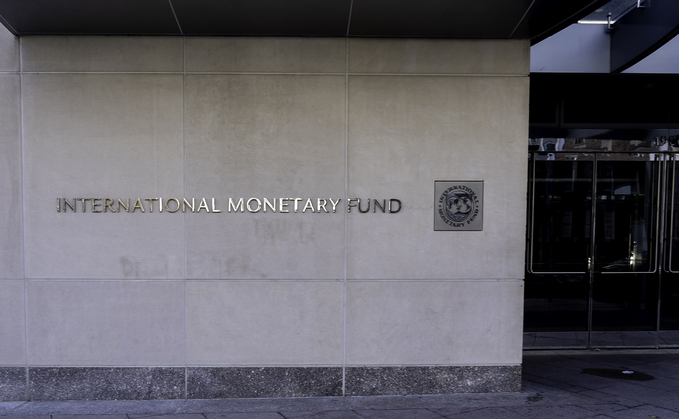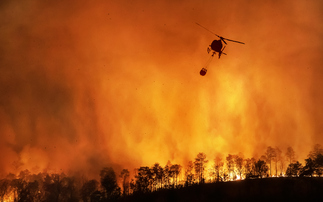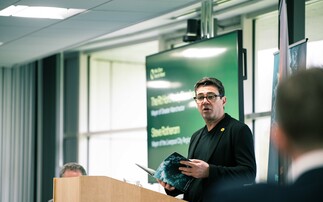Credit: iStock
Stephen Fry, Annie Lennox, Christiana Figueres, Forest Whitaker and Paul Polman join calls urging G20 leaders to support global financial reforms to fix debt and climate crises
More than 100 influential figures - from Hollywood actors and international popstars to global business figures and former world leaders - have joined the growing chorus of calls for major global financial reforms to help tackle the "unfair debt" they argue is stifling action towards tackling the climate crisis and meeting the UN's Sustainable Development Goals (SDGs).
In a letter addressed to G20 leaders today, which comes as the World Bank and International Monetary Fund (IMF) prepare to hold their critical annual Spring Meetings in Washington DC this week, scores of actors, musicians, politicians, economists and campaign groups have called for major reforms to the global financial architecture to support climate action, particularly in developing nations worldwide.
The open letter, coordinated by non-profit comms agency Project Everyone, has been signed by renowned actors, musicians and authors such as Stephen Fry, Annie Lennox, and Forest Whitaker, while former Labour MP David Miliband, former Unilever CEO Paul Polman, and former UN climate chief Christiana Figueres are have also signed the letter.
The letter urges G20 leaders to triple investment in multilateral development banks - including the World Bank - end "crippling debt" for developing nations, and to make polluters pay. Such demands build on previous on calls for public finance reform led by Barbados Prime Minister Mia Mottley, her Kenyan counterpart William Ruto, and French President Emmanuel Macron.
Other signatories include economist Mariana Mazzucato, filmmaker Richard Curtis, businessman Dr. Mo Ibrahim, and former politician Rory Stewart.
"The institutions of world finance have lost their muscle," the letter reads. "The world is rocked by conflict, food insecurity, biodiversity loss, and spiralling inflation. All of which are compounded by the devastation wrought by climate change. "The Sustainable Development Goals are under threat. Too many feel scarcity, austerity, despair."
The UN has estimated the total amount needed to achieve the SDGs worldwide is $5.4tr a year by 2030, yet this amounts to a near-$3tr shortfall based on current government policies.
Meanwhile, almost 60 per cent of low-income countries worldwide are also now in debt distress, meaning they are spending six times more on simply servicing that debt than the amount the World Bank lends in a year, according to the letter. That, in turn, is hampering the capacity for developing nations to take the actions necessary to avoid catastrophic climate change, the letter argues.
The letter – which has also been signed by leading NGOs Save The Children, The ONE Campaign, Oxfam, Project Everyone and Christian Aid – urges G20 leaders, the World Bank and the IMF to all seize the opportunity for reform in order to help support efforts to achieve the goals of the Paris Agreement.
"Change is already underway," the letter states. "The architects of the World Bank and the IMF earned their place in history. This is your chance to fulfil their promise: to transform these instruments for peace and prosperity and truly set them to work in our common interest. Triple the investment. End crippling debt. Make polluters pay. It's time to taste hope again."
Dr Joyce Banda, former President of the Republic of Malawi and one of the letter's signatories, said African leaders needed to invest in resilience, education, health and nutrition but remain held back by "unfair debt".
"Climate change has brought untold suffering to our people through loss of infrastructure and arable lands, leading to incessant hunger," she added. "We have no choice but to borrow more, perpetuating the vicious cycle. This has to stop. It's time to transform global public finance to pave the way for a fairer, more stable future for all."
Frustration has long been building over the slow pace of global financial reform to help support developing nations in securing investment towards the energy transition, and towards improving their resilience against worsening climate change impacts and extreme weather. The final agreement brokered at COP28 in December also faced criticism in some quarters for lacking detail and a clear package for countries embarking on their energy transition, and for how to fill the deep gap in finance for climate adaptation measures.
David Miliband, president and CEO of the International Rescue Committee, also highlighted the close links between climate, conflict and poverty worldwide. "The world's most fragile and conflict-affected states are often the most climate-vulnerable," he said. "To end extreme poverty and unlock sustainable development, G20 leaders should back financial architecture reform, deliver more concessional finance via the World Bank's International Development Association, and work with civil society to ensure the money gets to where it's needed most."
It comes alongside the launch on Friday of a new '10-point plan' of action designed to help the IMF and World Bank combat Africa's debt crisis.
Coordinated by non-profit groups Power Shift Africa and Earth4All, the action plan has been set out in an open letter which calls on leaders to immediately cancel public external debt payments for all African countries.
The letter argues broken climate finance promises to support African countries' climate goals - estimated at approximately $2.8tr - must be restored, and that climate and development finance should be funnelled into regenerative agriculture and agroecology to restore Africa's food sovereignty and renewable energy deployment for Africa's development rather than export.
Other recommendations in the letter include overhauling the credit rating practices of the big three agencies - S&P, Moody's, and Fitch - and for leaders to commit to urgent reform of the G20 Common Framework, a recently-developed solution to coordinate debt restructuring.
To tackle the debt crisis, the 10-point-plan also urges private lenders to participate in debt reduction and rescheduling of loan repayments from low-income African countries, asks leaders to honour commitments to reallocate the IMF's Special Drawing Rights to vulnerable countries, and calls for a credible reform path for the global debt architecture.
Finally, it states that climate finance debts owed by G20 countries should be paid in the form of unconditional grants and technology transfer, and urges leaders to stop promoting austerity conditions and promote bold, structural and transformative solutions at-scale, not small, superficial solutions.
"The Spring Meetings must be a rallying cry for urgent action to address the root causes of the debt crisis and to commit to meaningful reform of the global financial system and debt architecture," said Sandrine Dixson-Declève, co-president of business group The Club of Rome and executive chair of Earth4All.
"We urge wealthy countries to stop blocking serious reform efforts as they did at the 2023 Annual meetings. They must support proven solutions such as debt cancellation, removal of austerity conditions, fundamental reform of the G20 Common Framework, and increased mobilisation of domestic public resources through greater progressivity in domestic tax systems."
Want to understand what is going on at the cutting edge of sustainability? Check out BusinessGreen Intelligence - the premier information for professionals focused on the UK's green economy










